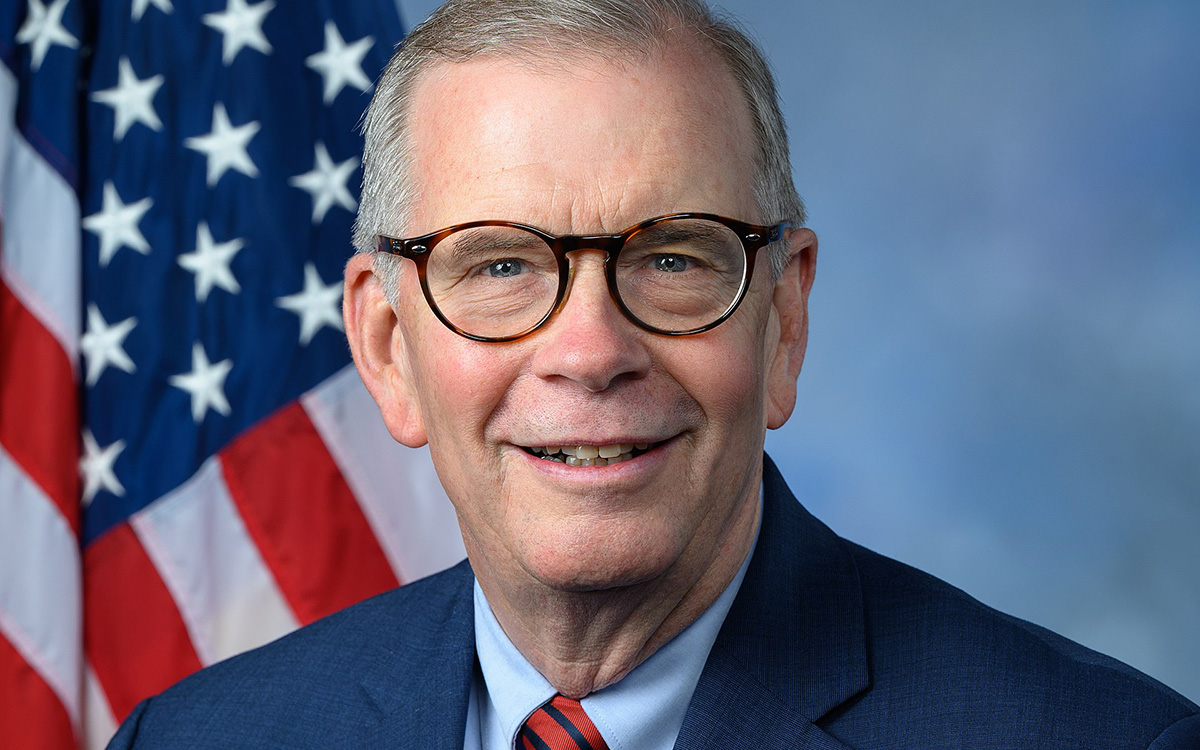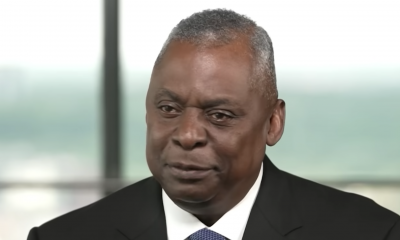Politics
Marine Corps leader responds to ‘Don’t Ask’ repeal questions
Marine Corps Commandant Gen. James Conway responded on Tuesday to media questions repealing “Don’t Ask, Don’t Tell” and offered mixed responses.
On one hand, Conway said the Marine Corps will “lead” in implementing repeal should the law change, but also said an “overwhelming number” of Marines wouldn’t want to room with someone who’s openly gay.
Conway’s remarks are notable because he’s reportedly the service chief who had most strongly come out against repeal of “Don’t Ask, Don’t Tell” in private discussions.
In a statement, Aaron Belkin, director of the Palm Center, a think tank on gays in the military at the University of California, Santa Barbara, praised Conway for saying the Marine Corps would lead in the implementation of repeal.
“Commandant Conway’s words are powerful,” Belkin said. “He has not been supportive of this change but he has now made clear that once the law is changed, the Marine Corps will set the pace for implementation of open service without delay.”
The transcript of his remarks on “Don’t Ask, Don’t Tell” is below:
Q: The Marine Corps in the next few years is going to be facing some big changes on two fronts. One would be the discussion about the role that the Marines play in future warfare, and then also the changes to personnel policy under — if “Don’t Ask, Don’t Tell” is lifted. So what advice would you like to leave your successors, considering that these changes will probably take place long after you’re gone? What would you like to say on those two fronts?
A: In terms of “Don’t Ask, Don’t Tell,” you know, we will obey the law. We’re anxious to see that the survey indicates when it’s made public towards the end of the year. But I caution our Marines and our Marine leadership: If the law changes we pride our Corps in leading the services in many, many things, and we’re going to have to lead in this too. There will be a hundred issues out there that we have to solve, if the law changes, in terms of how we do business, and we cannot be seen as dragging our feet or some way delaying implementation. We’ve got a war to fight. We need to, if the law changes, implement and get on with it.
Q: General, I wanted to pick up on “Don’t Ask, Don’t Tell.” As you know, the Senate’s going to pick it up next month as part of the authorization bill. And you’ve told the Hill that you think the current policy works and that you would never ask Marines to room with a homosexual if we can avoid it. You’ve been followed by other Marine generals — Jack Sheehan, Peter Pace, Carl Mundy — in opposing a change in the policy.
And also, if you look at the polls done by Military Times, the Marines seem to oppose any change in policy by a fairly significant margin.
And I want you to focus on: What is it about the Marines that they — they oppose this change in policy, repealing “don’t ask, don’t tell?” You’ve been in the Corps for over forty years. You get out there and talk to Marines. What is it that the Marines oppose about this — more so than the other services?
A: Well, that’s a tough question to answer, Tom, because I’m not as familiar with the other services as I am my own Corps. So any comparison or contrast is difficult.
But we recruit a certain type of young American, pretty macho guy or gal, that is willing to go fight and perhaps die for their country. That’s about the only difference that I see between the other services. I mean, they recruit from a great strain of young Americans as well. They all come from the same areas and that type of thing.
So I can only think that, as we look at our mission, how we are forced to live in close proximity aboard ship, in the field for long periods of time and that type of thing, that the average Marine out there, and by the way, my own surveys indicate that it’s not age dependent, it’s not rank dependent, it’s not where you’re from; it’s, as you highlight, pretty uniformly not endorsed as the ideal way ahead. But I just think all those things have impact on the Marines. And we’d just assume not see it change. But again, we will follow the law, whatever the law prescribes.
Q: As far as living in tight quarters, is that the issue you hear mostly when you talk to Marines out in the field?
A: Well, see, we, unlike the other services, we have consciously, for decades now, billeted by twos. So if the law changes, we start out with a problem in terms of how to address that. And I’ve spoken publicly some about that in the past.
You know, we’ll deal with it. I do not believe there’s money out there to build another requirement for BEQs, to allow every Marine to have a room by his or herself. So how we deal with the billeting problem is going to one of that myriad of issues that we’ll have to face.
Q: How would you deal with it?
A: I don’t know. I don’t know.
We sometimes ask Marines, you know, what is — what is their preference. And I can tell you that an overwhelming majority would like not to be roomed with a person who is openly homosexual.
Some do not object and perhaps — you know, perhaps a voluntary basis might be the best way to start, without violating anybody’s sense of moral concern or perception on the part of their mates.
I don’t know. We’re not there yet. And it’s one of those hypotheticals at this point that we have to consider but we won’t have to deal with until the law changes, if it does.
Q: I want to take you back to “Don’t Ask, Don’t Tell.” You said something that I’d like to ask you what you meant, with precision. You talked about — when you said that, you know, some Marines are skeptical of all this, you talked about the — and your words were ‘the moral perception that Marines have of people serving in the Marine Corps who are openly gay.’ What do you mean by moral perception?
A: Barbara, we have some people that are very religious. And I think in some instances — I couldn’t begin to give you a percentage, but I think in some instances we will have people that say that homosexuality is wrong, and they simply do not want to room with a person of that persuasion because it would go against their religious beliefs. So that’s my belief about some percentage of Marines in our Corps.
Q: And what do you — if that is the case, and the law changes, as a senior commander, then — it’s a volunteer force. Should those people leave?
Should accommodations be made? What do you — what do you do about that?
A: Yeah. Well, I think, as a commander, you try to satisfy the requirements of all your Marines. And if the law changes and we have homosexual Marines, we’ll be as concerned about their rights, their privileges, their morale as we will Marines who feel differently about that whole paradigm.
So commanders — local commanders will be required to assist us in making sure that every Marine is provided for and is focused on the fight at hand.
[h/t] advocate.com
Congress
Goodlander endorses Pappas’s Senate bid
Announcement puts gay congressman on the path to securing his party’s nomination

U.S. Rep. Maggie Goodlander (D-N.H.) on Thursday announced she will not run to represent her state in the U.S. Senate, endorsing gay U.S. Rep. Chris Pappas’s (D-N.H.) bid for the seat of retiring U.S. Sen. Jeanne Shaheen, putting him on the path to secure the Democratic nomination.
“We are in the fight of our lifetimes right now, of a moment of real crisis and challenge,” she said. “I feel humbled and grateful to so many people across our state who have encouraged me to take a look at the U.S. Senate, and after a lot of thought and conversations with people I love and people I respect and people who I had never met before, who I work for in this role right now, I’ve decided that I’m running for re election in the House of Representatives.”
When asked by a reporter from the ABC affiliate station in New Hampshire whether she would endorse Pappas, Goodlander said, “Yes. Chris Pappas has been amazing partner to me in this work and for many years. And I really admire him. I have a lot of confidence in him.”
She continued, “He and I come to this work, I think with a similar set of values, we also have really similar family stories. Our families both came to New Hampshire over 100 years ago from the very same part of northern Greece. And the values that he brings to this work are ones that that I really, really admire. So I’m proud to support him, and I’m really excited to be working with him right now because we’ve got a lot of work to do.”
Today in Salem @MaggieG603 tells @WMUR9 she is not running for U.S. Senate & endorses @ChrisPappasNH #NHPolitics #NHSen #NH02 #WMUR pic.twitter.com/W2CMrhRuIC
— Adam Sexton (@AdamSextonWMUR) April 17, 2025
“Maggie Goodlander has dedicated her career to service, and we can always count on her to stand up to powerful interests and put people first,” Pappas said in a post on X. “I’m so grateful to call her my friend and teammate, and I’m proud to support her re-election and stand with her in the fights ahead.”
Earlier this month, former New Hampshire Gov. Chris Sununu, a Republican, announced he would not enter the Senate race, strengthening the odds that Democrats will retain control of Shaheen’s seat.
Congress
EXCLUSIVE: Garcia demands answers on deportation of gay Venezuelan asylum seeker
Congressman’s correspondence was shared exclusively with the Blade

U.S. Rep. Robert Garcia (D-Calif.) is demanding answers from the Trump-Vance administration on its deportation of Andry Hernández Romero, a gay Venezuelan makeup artist who was sent to a prison in El Salvador in violation of a federal court order and in the absence of credible evidence supporting the government’s claims about his affiliation with a criminal gang.
Copies of letters the congressman issued on Thursday to Immigration and Customs Enforcement and CoreCivic, a private prison contractor, were shared exclusively with the Washington Blade.
Garcia noted that Hernández, who sought asylum from persecution in Venezuela over his sexual orientation and political beliefs, had entered the U.S. legally, passed a preliminary screening, and had no criminal record.
Pro-bono lawyers representing Hernández during his detention in the U.S. pending an outcome in his asylum case were informed that their client had been removed to El Salvador a week after he failed to show for a hearing on March 13.
Hernández’s family now fears for his safety while he remains in El Salvador’s Terrorism Confinement Center (CECOT), which has a well documented record of human rights abuses, Garcia said.
Additionally, the congressman wrote, while experts say Tren de Aragua does not use tattoos as identifiers, the “primary evidence” supporting Hernández’s deportation based on his supposed links to the transnational Venezuelan gang “appears to have been two crown tattoos labeled ‘Mom’ and ‘Dad,’ which are common cultural symbols in his hometown.”
The determination about his links to or membership in the organization was made by a CoreCivic employee whose criminal record and misconduct as a law enforcement officer led to his termination from the Milwaukee Police Department, Garcia wrote in his letter to the company.
Requesting a response by May 1, the congressman asked CoreCivic President Damon T. Hininger to address the following questions:
- What qualifications and training does CoreCivic require for employees tasked with making determinations about detainees’ affiliations?
- What protocols are in place to ensure that determinations of gang affiliation are based on credible and corroborated evidence?
- How does CoreCivic oversee and review the decisions made by its employees in such critical matters?
- What mechanisms exist to prevent and address potential misconduct?
- What is the nature of CoreCivic’s collaboration with ICE in making determinations that affect deportation decisions? Are there joint review processes?
- What background checks and ongoing assessments are conducted for employees involved in detainee evaluations, particularly those with prior law enforcement experience?
- What guidelines does CoreCivic follow regarding the use of tattoos as indicators of gang affiliation, and how does the company ensure that cultural or personal tattoos are not misinterpreted?
In his letter to Tae D. Johnson, acting director of ICE, Garcia requested answers to the following questions by May 1:
- Did ICE personnel independently review and approve the determination made by CoreCivic employee Charles Cross Jr. identifying Mr. Hernández Romero as a member of the Tren de Aragua gang?
- What evidence, beyond Mr. Hernández Romero’s tattoos, was used to substantiate the claim of gang affiliation?
- Under what legal authority are private contractors like CoreCivic permitted to make determinations that directly impact deportation decisions?
- What vetting processes and background checks are in place for contractors involved in such determinations? Are there oversight mechanisms to ensure their credibility and adherence to due process?
- What guidelines does ICE follow regarding the use of tattoos as indicators of gang affiliation, and how does the company ensure that cultural or personal tattoos are not misinterpreted?
Together with U.S. Rep. Maxwell Frost (D-Fla.), Garcia wrote to U.S. Rep. James Comer (R-Ky.) on Tuesday requesting permission to bring a congressional delegation to CECOT for purposes of conducting a welfare check on detainees, expressing specific concern for Hernández’s wellbeing. The congressmen said they would “gladly include any Republican Members of the committee who wish to participate.”
Hernández’s case has drawn fierce criticism of the Trump-Vance administration along with calls for his return to the U.S.
Influential podcaster and Trump ally Joe Rogan spoke out in late March, calling the deportation “horrific” and “a horrible mistake.”
Last week, California Gov. Gavin Newsom (D) sent a letter to Kristi Noem, secretary of the U.S. Homeland Security, which manages ICE, demanding Hernández’s immediate return and raising concerns with the right to due process amid the administration’s crackdown on illegal immigration.
Hernández “was denied the opportunity to defend himself against unsubstantiated allegations of gang involvement or to present his asylum claim,” the governor wrote. “We are not a nation that sends people to be tortured and victimized in a foreign prison for public relations victories.”
Immigrant Defenders Law Center President Lindsay Toczylowski, who is representing Hernández, has not been able to reach her client since his removal from the U.S., she told NBC News San Diego in a report published April 11.
“Under the Constitution, every single person has a right to due process, and that means they have a right to notification of any allegations the government is making against them and a right to go into court and prove that those allegations are wrong if that’s the case,” she said. “In Andry’s case, the government never gave us that opportunity. In fact, they didn’t even bring him to court, and they have forcefully sent him to El Salvador without ever giving us any notice or without telling us the way that we could appeal their decision.”
“CECOT, this prison where no one has ever left, where people are held incommunicado, is a very dangerous place for someone like Andry,” Toczylowski said.
In March, a DHS spokesperson posted on X that Hernández’s “own social media indicates he is a member of Tren de Aragua,” though they did not point to any specific posts and NBC reported that reviews of his known social media accounts turned up no evidence of gang activity.
During a visit to CECOT in March, Time Magazine photographer Philip Holsinger photographed Romero and reported that the detainee plead his innocence — “I’m not a gang member. I’m gay. I’m a stylist.” — crying for his mother as he was slapped and his head was shaved.
Congress
House Republicans advance two anti-trans education bills
Congresswoman Jahana Hayes, LGBTQ groups slammed the effort

Republicans members of the House Education and Workforce Committee advanced two anti-transgender bills on Wednesday, one that would forcibly out students in public elementary and middle schools to their parents and a second covering grades K-12 that critics have dubbed a “don’t say trans” bill.
More specifically, under the PROTECT Kids Act, changes to “a minor’s gender markers, pronouns, or preferred name on any school form or sex-based accommodations, including locker rooms or bathrooms” could not be made without parental consent, while the Say No to Indoctrination Act would prohibit schools from teaching or advancing “gender ideology” as defined by President Donald Trump’s anti-trans Jan. 20 executive order, Defending Women from Gender Ideology Extremism and Restoring Biological Truth to the Federal Government.
U.S. Rep. Jahana Hayes (D-Conn.), who was named national teacher of the year before her election to Congress, rose to speak out against the bills during the committee’s convening on Wednesday.
“Curriculum does not include teaching students to be something else. Curriculum does not include indoctrinating students to identify as gay or LGBTQ or other or anything. But federal law mandates that all students have civil rights protections,” she said.
The congresswoman continued, “I don’t really understand what the members of this committee think happens in schools, but my question is, what do we do with these children? The children who you are saying, on this committee, don’t exist, the children who are struggling with their identity and often times confide in their teachers and ask for support and help.”
“What we’re doing in this committee is focusing on a small population of students who are at a point in their life where they are struggling and school may, for many of them, feel like the only safe place or the only place where they can get support, or the only place where they can speak to a counselor,” Hayes said.
“And as a teacher, I don’t care if it was just one student that I had to reassure that they were important and they were valued and they belonged here,” she said. “I’m going to do it, and anyone who has dedicated their life to this profession will do the same. So the idea that you all feel okay with arbitrarily erasing, disappearing people, making them think that they they don’t exist, or they don’t have a place in schools, or the curriculum should not include them, or whatever they’re feeling should not be valued, considered, Incorporated, is just wrong.”
“So I will not be supporting this piece of legislation, as if that was not already evident, and I will be using all of my time, my agency, my energy, my advocacy, to ensure that every student,” Hayes said, “feels valued, respected, important and included in the work that I engage in on this committee.”
The congresswoman concluded, “when you are in a classroom and you are a teacher, and that door closes and a student falls in your arms and says to you, I am struggling, and I can’t go home with this information, and I need Help, you have a moral responsibility to help that child or you are in the wrong profession. I yield back.”
The Congressional Equality Caucus slammed the bills in an emailed statement from the chair, U.S. Rep. Mark Takano (D-Calif.), who noted that the legislation comes as “Donald Trump is illegally trying to dismantle the Department of Education and pass tax cuts for billionaires.”
“Extreme Republicans in Congress are trying to distract Americans by advancing cruel, anti-trans legislation,” said the congressman, who is gay. “School districts, teachers, and staff best understand how to draft age-appropriate, inclusive curriculums and craft policies that both respect the important role parents play in children’s education and the importance of students’ safety.”
“Yet, Republicans’ Don’t Say Trans Act would cut critical funding for schools if their teachers teach lessons or include materials that simply acknowledge the reality of trans peoples’ existence,” Takano added. “Republicans’ forced outing bill would put kids in danger by requiring schools that want to take certain steps to affirm a transgender student’s identity to forcibly out them to their parents — even if the school knows this will put the student’s safety at risk.”
The caucus also slammed the bills in a series of posts on X.
🚨BAD BILLS ALERT🚨
— Congressional Equality Caucus (@EqualityCaucus) April 9, 2025
Today, the GOP-controlled Education Committee is voting on two anti-trans bills: One to force teachers to out trans students if they want to take certain steps to affirm the students’ identities, and a “Don’t Say Trans” bill.
Here's why we’re opposed: 🧵
The Human Rights Campaign also issued a statement on Wednesday by the organization’s communications director, Laurel Powell:
“Instead of putting our dangerous President in check and tackling the American economy’s free fall, House Republicans showed where their priorities lie — giving airtime to junk science and trying to pass more anti-LGBTQ+ legislation.
“Forcing teachers to ‘out’ trans youth rather than supporting them in coming out to their families and demanding that schools ignore the trans students who sit in their classrooms is a craven attempt to distract people from economic disaster by vilifying children.
“Even as they fire people whose jobs were to make sure schools have the resources they need, the Trump administration and their allies in Congress continue to attack vulnerable young people to score points with the far right.”
-

 District of Columbia4 days ago
District of Columbia4 days agoFinal push to raise funds, fill D.C. hotels as WorldPride nears
-

 El Salvador2 days ago
El Salvador2 days agoGay Venezuelan makeup artist remains in El Salvador mega prison
-

 District of Columbia4 days ago
District of Columbia4 days agoReenactment of 1965 gay rights protest at White House set for April 17
-

 Maryland4 days ago
Maryland4 days agoFreeState Justice: Transgender activist ‘hijacked’ Moore’s Transgender Day of Visibility event













